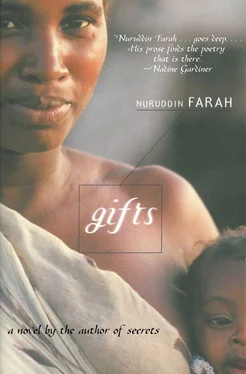Nuruddin Farah - Gifts
Здесь есть возможность читать онлайн «Nuruddin Farah - Gifts» весь текст электронной книги совершенно бесплатно (целиком полную версию без сокращений). В некоторых случаях можно слушать аудио, скачать через торрент в формате fb2 и присутствует краткое содержание. Год выпуска: 2011, Издательство: Arcade Publishing, Жанр: Современная проза, на английском языке. Описание произведения, (предисловие) а так же отзывы посетителей доступны на портале библиотеки ЛибКат.
- Название:Gifts
- Автор:
- Издательство:Arcade Publishing
- Жанр:
- Год:2011
- ISBN:нет данных
- Рейтинг книги:3 / 5. Голосов: 1
-
Избранное:Добавить в избранное
- Отзывы:
-
Ваша оценка:
- 60
- 1
- 2
- 3
- 4
- 5
Gifts: краткое содержание, описание и аннотация
Предлагаем к чтению аннотацию, описание, краткое содержание или предисловие (зависит от того, что написал сам автор книги «Gifts»). Если вы не нашли необходимую информацию о книге — напишите в комментариях, мы постараемся отыскать её.
Gifts — читать онлайн бесплатно полную книгу (весь текст) целиком
Ниже представлен текст книги, разбитый по страницам. Система сохранения места последней прочитанной страницы, позволяет с удобством читать онлайн бесплатно книгу «Gifts», без необходимости каждый раз заново искать на чём Вы остановились. Поставьте закладку, и сможете в любой момент перейти на страницу, на которой закончили чтение.
Интервал:
Закладка:
“Do you have sugar?” she said.
He said neither yes nor no but, “Anything else?” while he was still in deep thought, maybe praying. She looked up at the gaping shelves in the hope that their emptiness might inspire her. “What about rice?”
But then both of them fell silent when a neighbour, clearly not one of Aw-Cumar’s favourite clients, came in and asked if there was any likelihood of his selling to her half a pound of sugar for any sum he wished to name. Aw-Cumar’s head shook with actorly sadness, saying, “I’m afraid I have no sugar, not even for my own family’s consumption.”
When the woman-customer had been gone a good few minutes, Aw-Cumar called one of his daughters who rushed in through the back door, coming as she did from the inner compound at the rear of the store, a highly valued property belonging to the shop. Her father’s hand lay on the young girl’s coxcomb-hairdo as he turned to Duniya asking, “How much sugar and how many kilos of rice would you like?”
“Three kilos of sugar, or is that too much to ask for?” she hesitated.
“Five?”
“Ail right, five.”
“And three kilos of rice, the best, imported from China?”
“Thank you,” she said.
And there he was, waiting for her to order anything her heart desired.
“Would you like some flour?” he inquired of her, when she couldn’t come up with any orders.
“Do you have flour?”
“Would ten kilos do?”
“Thank you,” she said.
“Would you like a kilo of raisins?”
“At times I wonder why you are so kind to me.”
“You’ve been kind, a mother to an abandoned baby,” he said, and after a pause continued, “And don’t think of thanking me, for what I have is yours and if I am in short supply myself then I cannot help it.” He scribbled something on a piece of paper, gave the chit to his daughter whose coxcomb he held onto as he said, “Take this to your stepmother and bring back what is written here. All right?” But he wouldn’t let go of the girl until he insisted that Duniya maybe ask for the universe and he, Aw-Cumar would serve it to her, right off his counter, heaven, hell and all.
“That’s all for now, thanks,” she stammered.
And the young girl rushed out of the store through the door in the rear, with a shriek of childish excitement. There were repeated cries of anger as she interrupted her sisters’ game of hopscotch.
“May I have the accounts book please?” said Duniya.
Aw-Cumar opened and closed a couple of drawers, looking for it. Duniya remembered an embarrassing incident when Mataan, thrilled at the arithmetic abilities of which he was proud, had taken it upon himself to do the totalling up of Duniya’s debts, discovering an ugly discrepancy. This caused both Aw-Cumar and Duniya a great deal of distress, and he swore he hadn’t done it deliberately From then on, it was agreed that Nasiiba and no one else would enter in the accounts book any sum owed to Aw-Cumar.
“Here,” he said presently, giving her the accounts book.
The sum owed to him was entered in Nasiiba’s hand in this exercise book, with one of its covers already torn off. Like a door hanging on a half-broken hinge, the other cover held, more or less, on the teeth of additional staples punched on the side. Nasiiba had scribbled in ink the words “Duniya & Family: Accounts.”
Opening and turning the pages Duniya discovered that all the bills had been settled by Nasiiba, all until a week ago. Duniya’s look was of a disturbed kind, noting to herself that perhaps the money in the Iranian Islamic magazine had a wicked story behind it.
Aw-Cumar said, “Is something worrying you?”
“No, nothing.”
“Please tell me what’s bothering you, because I can see your eyes going pale with preoccupation,” he said. “Let me assure you that your accounts book is clean like the slates of a saint at Judgement Day, not a single stain anywhere.”
Improvising, Duniya said, “I’ve come bearing sad news.”
“Oh?”
“We are moving out of the district.”
Aw-Cumar’s features displayed a genuine sorrow. “But we shall miss you!”
“The children and I will miss you too.”
He was a most discreet man. Duniya suspected that Aw-Cumar was in on the gossip being circulated in the neighbourhood, about a wealthy US-returned Somali who was infatuated with “our midwife.” But he made no reference to it, not even when he inquired if they knew where they would be moving.
When Aw-Cumar’s daughter brought back Duniya’s provisions in a large carrier bag advertising a brand of cigarettes, Duniya asked, “How much do we owe you for this blessed manna from the heavens of your kindness?”
His lips trembled with sums which he committed instantly to paper; finally he added the sums up in his head and gave her the total. Duniya entered and initialled it in the exercise book.
She was feeling ill at ease because she had lied to him. After all she had not come with the intention of buying any provisions, only to take a look at the accounts book Was this why she was becoming garrulous? And why didn’t she leave directly after she had received her supply of food? “My brother Abshir is paying us a visit shortly and we are very excited at the thought and eager to welcome him,” she volunteered.
“How long has it been since he was last here in Mogadiscio?” One might have thought he was talking about somebody he knew Maybe he remembered how often Abshir’s name came up in Duniya or Nasiiba’s conversations in a casual manner, particularly with regard to their provision of foreign currency, since he was the primary source.
“Long before the twins were born,” she said.
Aw-Cumar was a very kind man. “I would certainly like to make his acquaintance, although he has been but a name to me all these years,” he said.
Aw-Cumar’s daughter ran off to broadcast the news that Nasiiba’s mother was moving out of the district to the others who were still playing some kind of hopscotch. A moment later another little girl was scampering away from her hiding-place with the exciting news that Nasiiba’s uncle was coming to Mogadiscio soon. These took their toll of emotions and Duniya’s throat filled with tears and this made her voice very hoarse. “Thank you very much, Aw-Cumar,” she repeated, hardly able to say a word without pausing.
“Please don’t move out of the district without letting us know your new address, as we would like to keep in touch with you and your children, of whom we are terribly fond,” he said.
She promised she wouldn’t move without alerting them to the fact.
Entering her place which was a little under a hundred metres away, Duniya shouted “ Hoodi-hoodi” and was expressly delighted to hear Bosaaso’s “Come in.” He joined her near the gate to help her carry in the provisions. Then he said anxiously, “I must fetch Nasiiba and Yarey.”
“And where are they?” she said, hoping he might tell her out of absent-mindedness.
“Ask them yourself when they are back,” he insisted.
“You know I won’t,” she said.
“Fair enough then,” he said, “for I won’t tell you.”
But she had the weird feeling they were at Bosaaso’s place, watching something on his video. A hostile expression clouded her features briefly. Then she told herself that she should have a high-handed word with Nasiiba. After all, Duniya wanted to put her house in order before Abshir’s arrival, and before making up her mind about Bosaaso.
“See you soon then,” she said, dismissing him that way.
And he was gone.
The meal that evening was a dull affair: red beans and rice, a commonplace dish, Mogadiscio’s staple nightly diet. It was Nasiiba’s garlic sauce that brightened things up, giving the food a sharper taste. Duniya wished she had made the meal more interesting, if only for Bosaaso’s sake. No doubt she appreciated his willingness to share whatever they were eating. Very humble of him, indeed.
Читать дальшеИнтервал:
Закладка:
Похожие книги на «Gifts»
Представляем Вашему вниманию похожие книги на «Gifts» списком для выбора. Мы отобрали схожую по названию и смыслу литературу в надежде предоставить читателям больше вариантов отыскать новые, интересные, ещё непрочитанные произведения.
Обсуждение, отзывы о книге «Gifts» и просто собственные мнения читателей. Оставьте ваши комментарии, напишите, что Вы думаете о произведении, его смысле или главных героях. Укажите что конкретно понравилось, а что нет, и почему Вы так считаете.











